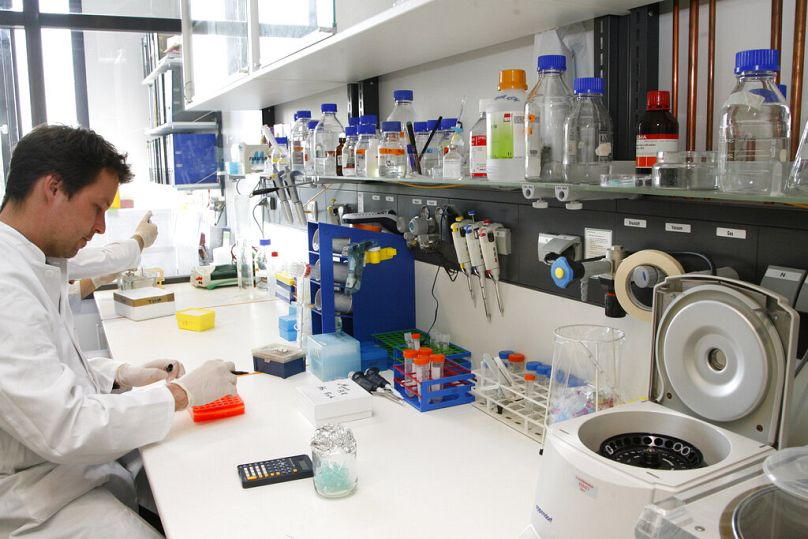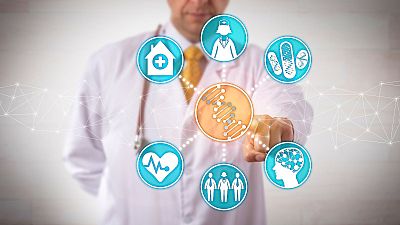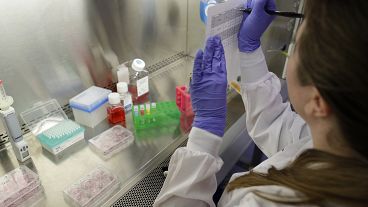We find ourselves at a pivotal moment where digital and AI tools have the potential to disrupt traditional work models and facilitate new approaches, Brice Challamel writes.
The potential of artificial intelligence (AI) in accelerating the development of new medicines and expanding their accessibility to a wider population is tremendous.
By driving innovation, streamlining operations, and enhancing the effectiveness of products, we are poised to enter a new era of healthcare where breakthrough treatments and improved patient outcomes become a reality.
Vaccine development has seen a significant transformation over the past few years thanks to the profound influence of AI.
Before reaching the market, vaccines must undergo several stages, including laboratory testing, clinical trials, scientific assessment, and authorisation.
AI has helped streamline most of these processes, making them more efficient, cost-effective, and responsive to emerging health challenges. Its application in vaccine development not only expedites the process but also improves the quality, accessibility, and targeted application of vaccines.
As a result, diseases have a lesser impact, their spread is better contained, and global populations may experience improved health outcomes.
In research, AI is beginning to revolutionise how clinical experiments are conducted, and medicines are being designed.
By automating complex lab tests and providing valuable outcome information, AI saves valuable time and resources.
Additionally, in clinical development, it aids in identifying suitable participants for trials. Its ability to synthesize large amounts of data and generate code that runs data analysis saves our expert panels significant time associated with manual and error-prone data extraction to provide them with clear, reliable, and well-structured immunogenicity and toxicity reports.
These facilitate, in return, regulatory exchanges and alignment to accelerate decision-making, resulting in faster time in ensuring access for patients.
People at the centre of the transformation
Unlike traditional operating models that rely on expanding workforces as a business grows, real-time AI companies emphasise the value their employees bring to the scaling process.
Rather than accepting the inherent complexity and challenges that often accompany growth, companies that embrace and democratise AI enable every employee to contribute towards increased efficiency by accelerating time for knowledge work and effectiveness by improving its outcome.
Putting employees first means empowering them with user-friendly AI-powered tools, connected to their data and applications, that enhance and streamline their everyday workflows.
Integrating technology into business processes offers several benefits, starting with AI awareness in this early adoption period, and fostering understanding and enthusiasm among employees.
This immersive approach to AI adoption can be further enhanced by offering localised, action-driven learning opportunities through networks of champions identified and trained to amplify and accelerate the change process. Our champions are called GACT, the four bases of the DNA and the abbreviation for Generative AI Champions Team.
AI helps us punch above our weight
To ensure successful technology adaptation within an organisation, it is important to go beyond mere adoption and strive for proficiency.
This is where the 30-70 rule comes into play. This rule suggests that dedicating 30% of time and effort to ensuring the technology functions properly is crucial.
However, the remaining 70% should focus on user readiness for future advancements through concrete demonstrations, best practice sharing from the AI Champions on their teams, AI design joint sessions with tech partners and rethinking business organisation in the light of a new information paradigm.
In the context of leveraging AI for clinical trial data analysis, this means, for instance, merging human benefits analytics with technical development to anticipate the ease of manufacturing and the sustainability of products throughout their distribution lifecycle.
Striking this balance and redefining cross-functional cooperation enables organisations to achieve a high level of technology integration into their operating model and create a positive cultural mindset, something which we have made a priority at Moderna.
AI is far from new to our organisation. Since our founding, we have always sought to expedite the process of bringing mRNA medicines from development to market and continuously improve our mRNA vaccines and therapeutics.
This is why we made an early and strategic choice to integrate AI tools into our research platform, for example, enabling us to amplify innovation on a large scale. We're a company of roughly 5,000 people, punching way above our weight with the help of AI.
This allows us to expand our research capabilities and scale up vaccine production, ultimately better safeguarding global public health.
Necessitating responsible adaptation
The healthcare sector is undergoing a significant transformation due to the increasing availability of healthcare data and advancements in analytic techniques.
AI tools are pivotal in this transformation by offering immense potential to improve health advancements across various disease areas.
However, it's important to recognise that AI systems are complex, and their effectiveness relies not only on the underlying code but also on the quality of the data they are trained on, which is derived from clinical settings and user interactions.
To ensure the responsible use of AI and mitigate potential risks like the amplification of biases present in training data, it is crucial to establish regulation in the field.
The democratisation, adoption, and proficiency surge in data and AI requires a heightened sense of responsibility in how we leverage such a powerful new technology, which has led us to publish and enforce an AI Code of Conduct focused on integrity, quality, and respect.
We find ourselves at a pivotal moment where digital and AI tools have the potential to disrupt traditional work models and facilitate new approaches.
To thrive in this ever-evolving digital landscape, technology-savvy companies focus on adopting, customising, and training AI tools to enrich their business models and drive sustainable growth while ensuring responsible use.
In that sense, AI is crucial to our mission of delivering the best possible impact through mRNA medicines.
Brice Challamel is Vice President, AI Products & Platforms at Moderna.
At Euronews, we believe all views matter. Contact us at view@euronews.com to send pitches or submissions and be part of the conversation.





